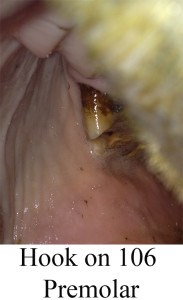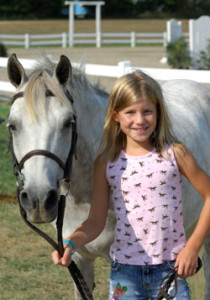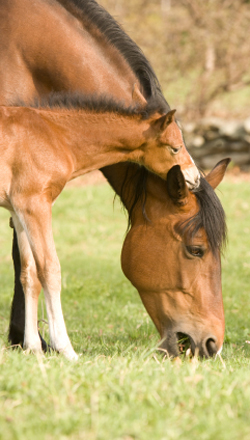 A horse’s teeth are not designed like human’s teeth are. A horse’s teeth are very long when they are young and continuously erupt during most of their adult life until the tooth has expired. As each tooth wears down, the unexposed part of the tooth is pushed forward into the mouth to replace what has been worn down. This process is called eruption. The chewing surface (occlusal) of the maxillary check teeth (upper arcades) and mandibular cheek teeth (lower arcades) sometimes do not match perfectly (anisognathic). Also, as the teeth wear down from chewing, sharp points may form on the cheek (buccal) side, on the maxillary, and on the tongue or lingual side of the mandibular. These sharp points will eventually form ulcers in the cheek as well as the tongue and are uncomfortable to the horse. A horses teeth can also get out of alignment.
A horse’s teeth are not designed like human’s teeth are. A horse’s teeth are very long when they are young and continuously erupt during most of their adult life until the tooth has expired. As each tooth wears down, the unexposed part of the tooth is pushed forward into the mouth to replace what has been worn down. This process is called eruption. The chewing surface (occlusal) of the maxillary check teeth (upper arcades) and mandibular cheek teeth (lower arcades) sometimes do not match perfectly (anisognathic). Also, as the teeth wear down from chewing, sharp points may form on the cheek (buccal) side, on the maxillary, and on the tongue or lingual side of the mandibular. These sharp points will eventually form ulcers in the cheek as well as the tongue and are uncomfortable to the horse. A horses teeth can also get out of alignment.
When this happens several pathologies can occur to the teeth. These may include waves, hooks, ramps, excessive transverse ridges, and other pathologies that will not let the lower jaw move freely and/or prohibit lateral excursion (necessary for the horse’s proper chewing motion).
Horses can also have periodontal disease. Periodontal disease affects the gums and ultimately the roots of the tooth. This disease is very often painful and can lead to the death of the tooth if not treated. To diminish the risk of periodontal disease we equilibrate and balance the horses’ teeth, making the pressure and forces from the opposing teeth equal. Equilibrating and balancing the teeth also helps the horse eat and digest food properly, thereby decreasing the risk of colic.
 Some signs that your horse may be in need of dental treatment include dropping feed, throwing their head, refusing to turn to the left or to the right, slowing down around barrels, not collecting properly, eating their food in an odd manner, and having neck or back pain.
Some signs that your horse may be in need of dental treatment include dropping feed, throwing their head, refusing to turn to the left or to the right, slowing down around barrels, not collecting properly, eating their food in an odd manner, and having neck or back pain.
We recommend that foals six months old and older should ideally have a dental exam every 6 months until they are three years old. This allows for the detection of abnormalities such as impacted caps and sharp points. Generally we do not equilibrate and balance teeth for performance horses until they are two years old.
As your horse ages his teeth will begin to expire and may become loose. Loose teeth are painful teeth and can cause your horse to lose weight quickly. Older horses 21+ may require an oral exam every six months but this will vary from horse to horse.
Keep in mind that the earlier you start dental care in the horse’s life, the longer their teeth will last as they age.
